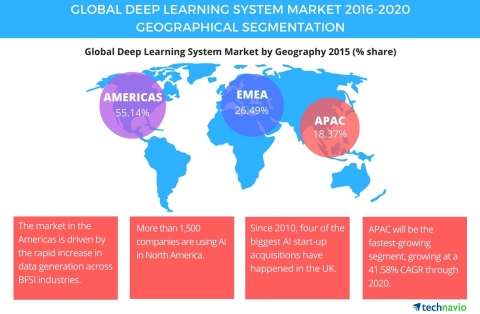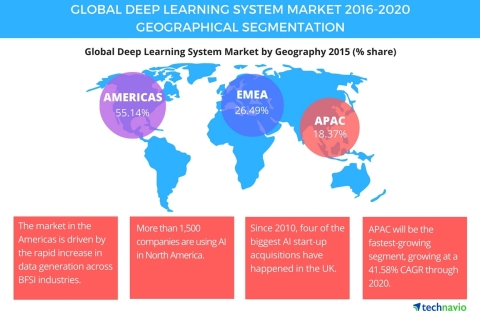LONDON--(BUSINESS WIRE)--Technavio has announced the top six leading vendors in their recent global deep learning system market report. This research report also lists 11 other prominent vendors that are expected to impact the market during the forecast period.
The global deep learning system market is expected to reach USD 1,325.3 million by 2020, growing at a CAGR of 38.73% during the forecast period. Deep learning has the potential to be very useful for real-life applications, due to which it has attracted a lot of attention. In most of the real-life applications, a large amount of information is gathered from social media, software service agreements, hardware, website cookies and app permissions. All this data cannot be used to train machine learning programs, and it is time-consuming and very expensive. Deep learning networks are helpful to get very valuable business information from this data as they excel at unsupervised learning.
Competitive vendor landscape
The global deep learning system market is highly fragmented with the presence of many large and small players. Technavio analysts expect market competition to intensify as different vendors foray into this market. The multiplicity of vendors with differentiated products has raised the competition, and vendors continue to innovate in a bid to establish themselves in the market. In addition, product selection has become more convoluted with the availability of advanced technologies.
“The growth of players in the market depends on their capabilities to combine technology with business expertise, data management expertise, and technology maturation. The shortage of skilled workforce will be a challenge for market vendors. Intense competition, rapid changes in the technology, and industry barriers constitute significant risks to vendors,” says Ishmeet Kaur, a lead enterprise application analyst from Technavio.
To grow, vendors should provide value-added services such as consultancy, integration of solutions, support and maintenance, and end-user training to address available opportunities and risks.
Request a sample report: http://www.technavio.com/request-a-sample?report=54609
Technavio’s sample reports are free of charge and contain multiple sections of the report including the market size and forecast, drivers, challenges, trends, and more.
Top six deep learning system market vendors
Alphabet
In November 2015, Alphabet's Google announced that it is opening its TensorFlow deep learning framework under the open-source Apache 2.0 license for others to use. TensorFlow is a deep learning framework developed by Google's Machine Intelligence Research Organization. It is used for numerical computation with the help of data flow graphs. It consists of Python APIs and uses data flow graphs for performing numerical computations. The nodes in the graph represent mathematical operations and the edges signify multidimensional data array. TensorFlow has a fast-growing community of users and contributors, which makes it an important deep learning framework.
BVLC
BVLC provides an environment that facilitates opportunities for technology transfers and additional sponsored approach to researchers and implementers. BVLC and community contributors developed deep learning platform named Caffe under BSD 2-Clause license. Caffe is developed using C++ programming language with expression, speed, and modularity in mind. It has various features such as expressive architecture, extensible code, and fast speed.
Facebook provides a deep learning framework Torch, which helps users train large-scale convolutional neural networks for applications such as image recognition, AI, and neural network applications. Torch is a systematic computing framework that offers wide support for machine learning algorithms. It is built using Lua that runs on Lua (JIT) compiler. The Tensor libraries that come with it have very efficient CUDA backend, and neural networks libraries can be used to build random acyclic computation graphs with automatic differentiation functionalities.
LISA lab
LISA lab at the University of Montreal developed deep learning framework named Theano. Theano is a software package or math expression compiler that efficiently defines, evaluates, and optimizes mathematical expressions involving multi-dimensional arrays. It allows the user to write code and compile it on different architectures such as CPU and GPU. It is not only used for machine learning applications, which are CPU-intensive but also used for large neural network or deep learning.
Microsoft
The Computational Network Toolkit (CNTK) is an open-source unified deep-learning toolkit from Microsoft Research. This is used to speed up developments in AI and makes it easy to combine and train popular deep learning model types across multiple GPUs and servers. CNTK is used in many applications such as speech recognition, machine translation, image captioning, image recognition, language modeling, language understanding, and text processing and relevance.
Nervana Systems
On August 9, 2016, Intel announced that it is acquiring Nervana Systems, a deep learning start-up, to strengthen the role of AI solutions within the company. Nervana developed a Python-based deep learning framework named Neon. It has recently been open-sourced under an open-source Apache 2.0 License. Neon has customized CPU and GPU backends, branded as NervanaCPU and NervanaGPU backends, respectively.
Browse Related Reports:
- Global Automotive Pedestrian Protection System Market 2016-2020
- Global Automotive Telematics Market 2016-2020
- Global Higher Education Financial and HRM Market 2016-2020
Do you need a report on a market in a specific geographical cluster or country but can’t find what you’re looking for? Don’t worry, Technavio also takes client requests. Please contact enquiry@technavio.com with your requirements and our analysts will be happy to create a customized report just for you.
About Technavio
Technavio is a leading global technology research and advisory company. The company develops over 2000 pieces of research every year, covering more than 500 technologies across 80 countries. Technavio has about 300 analysts globally who specialize in customized consulting and business research assignments across the latest leading edge technologies.
Technavio analysts employ primary as well as secondary research techniques to ascertain the size and vendor landscape in a range of markets. Analysts obtain information using a combination of bottom-up and top-down approaches, besides using in-house market modeling tools and proprietary databases. They corroborate this data with the data obtained from various market participants and stakeholders across the value chain, including vendors, service providers, distributors, re-sellers, and end-users.
If you are interested in more information, please contact our media team at media@technavio.com.




